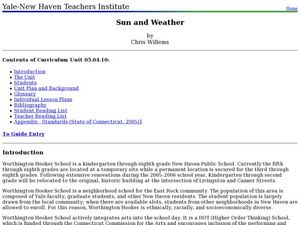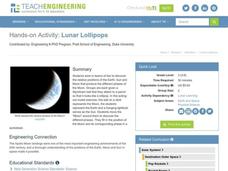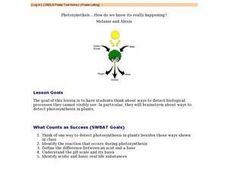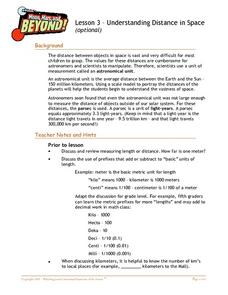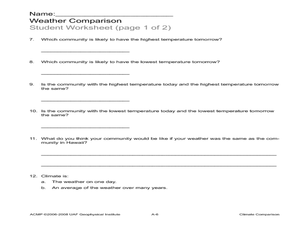Curated OER
Sun and Weather
How is the Earth's weather created? Middle schoolers will explain how the Sun's energy is transformed into different forms. They will perform mathematical calculations of volume, mass, and temperature. They they will explain the...
Curated OER
Lunar Lollipops
Students work with a partner, Styrofoam ball and light source to simulate the positions of the Earth, Moon and Sun at various stages during the phases of the Moon. They describe why the Moon is visible from Earth and complete a worksheet.
Curated OER
Photosynethsis....How do we know it's really happening? - Biology Teaching Thesis
High schoolers think of one way to detect photosynthesis in plants besides those ways shown in class. They identify the reaction that occurs during photosynthesis. Students define the difference between an acid and a base. They identify...
Curated OER
Understanding Distance in Space
Students discover the vocabulary used for distances in space and review measurement units and instruments before creating a scale model of the planets. They determine how to calculate the relative distances between the planets using a...
Curated OER
Keep It Cool
Students complete a science experiment to study insulation, heat transfer, and permafrost. In this permafrost study lesson, students design and test a soda insulator. Students graph their class data and discuss the results. Students...
Curated OER
Climate Comparison
Students explore climate regions. In this climate lesson, students examine the climate regions of Alaska as well as the state of Hawaii. Students research selected Internet sources to gather information regarding the climates present in...
Curated OER
A Comparison of Land and Water Temperature
Young scholars examine NASA satellite observations of surface temperature and investigate the seasonal changes of land and water temperature.
Curated OER
Measuring the Diameter of Our Star
Students conduct an experiment to measure the diameter of the sun. In this astronomy lesson, students construct a simple equipment to collect scientific data. They calculate the sun's diameter using a given formula.
Curated OER
Investigating and Using Biomass Gases
Young scholars examine the definitions of biomas gasification and generate their own biomass gas. In this renewable energy instructional activity students collect gases and roast a marshmallow.
Curated OER
Understanding Cloud Formation
Learners view a demonstration that simulates cloud formation. They read a poem about clouds, participate in a class demonstration using warm water and ice and write a paragraph summarizing their observations.
Curated OER
What Is In The Water?
Students investigate the biotic and abiotic factors that are found in an aquatic ecosystem. The emphasis is upon the investigation of present an projections of future water quality. Then students visit a local body of water to gather...
Curated OER
Rain Reasons
Young scholars explore how climatic factors influence the growth of plants. They create an experiment to find how variations in water, light, and temperature affect plant growth and describe how precipitation and geography can affect the...
Curated OER
Nature's Air Conditioner
Students observe the process of transpiration in leaves. They measure how much water a leaf gives off in a 24-hour period, calculate the volume, and answer discussion questions.
Curated OER
A Comparison of Land and Water Temperature
Learners use the NASA website's Live Access Server to create a graph of surface temperature at two locations on earth. They analyze the data and then answer specific questions provided in this lesson. They also examine and compare the...
Other popular searches
- Solar System Math Lessons
- Solar System Math Graph
- Solar System Math Age
- Solar System Math Ration
- Solar System Math Lessons'
- Solar System Math Worksheets
- Math Solar System
- Math Science Solar System
- Math and Science Solar System
- Solar System Math Lesson Plans
- Solar System Mathematics


